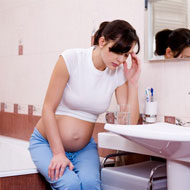Diet & Home Remedy For Morning Sickness In Second Time Pregnant Mother
Being nauseous or throwing up is one of the more distinctive symptoms of pregnancy. Typically, pregnant women throw up right after breakfast, which is why this condition is known as morning sickness.
However, there are several women who have to put up with this feeling through the afternoon and well into the night too.
Morning Sickness in Second Pregnancy
Morning Sickness in Second Pregnancy
There is no clear explanation for why some women feel extremely nauseous while others seem to breeze through their pregnancy without a peep.
In fact, there are several instances wherein women who have had very nauseous first pregnancies and have escaped the nausea experience altogether the second time around. It is believed that there could be a possible relation between nausea and the hCG hormone levels. It is likely that when the hCG levels are high, vomiting and nausea worsens. In certain pregnancies where the hCG levels are too low and the pregnancy is heading towards a miscarriage, the nausea will also be very mild or even non-existent
However, this does not automatically imply that no nausea is a sign of a potential miscarriage. As mentioned earlier there are instances where women go through their trimesters without any nausea and deliver a healthy baby safely. Small comfort though it is, morning sickness is considered to be a sign of healthy pregnancy.
Second Pregnancy Morning Sickness Duration
Here there is definitely good news. Vomiting and nausea strikes in the first trimester and is all gone by the second trimester. Typically it starts around the sixth week of pregnancy, although it has been known to start as early as the fourth week too. The nauseous feeling is at its worst around the ninth and tenth week and generally reduces or completely disappears in 14 weeks, 16, at the most.
If the woman is pregnant for the second time and she is nauseous this time too, her nauseous phase is pretty much going to be same as it was the first time around. But it will be easier to handle this time because the woman is better prepared with her bed time crackers and fluids.
Most women do hope that when they are having their second baby they don't have to go through morning sickness again but it's unfortunately something they have no control over.
There are some treatments or precautionary measures a woman can take to make this morning sickness more bearable.
Food for Morning Sickness Second Pregnancy
Diet is critical at this stage. When you know you have morning sickness, it's sensible to stick to bland foods and avoid the oily, fatty, spicy stuff. During the first trimester, it's alright if you can't balance your diet because sometimes the essential nutrients will be in foods that make you throw up and you are forced to avoid them. Consume liquids separately and since you know you can be sick after meals, split them into smaller meals throughout the day instead of three large meals. Avoid carbonated drinks and if you're having your second baby, you know by now how important it is to keep a packet of crackers next to your bed for a quick bite in the morning before you wake up.
Home Remedies for Morning Sickness Second Pregnancy
Then of course, there are several remedies that help. Some women find that the smell of sweet lime reduces the nauseous feeling. Others have been known to respond well to fresh ginger. In fact ginger root is used in various traditional remedies to obtain relief from this feeling. Most often women find this nausea relieved through a trial and error process. It's a matter of discovering which smells don't make you throw up.
Here are Some Instant Tips for: 8 Ways to Ease Morning Sickness During Pregnancy


